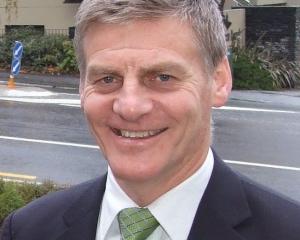
That might sound surprising. But it is not for the reasons Mr Goff cited.
He will want to believe last Tuesday's meeting in Dunedin of Labour's front-bench MPs really did assuage his colleagues' worries about the botched manner in which he handled Mr Hughes once he was told by his senior whip that he was the subject of a police investigation. The feeble attempt after the meeting to display a show of unity spoke otherwise.
No, Mr Goff's position is stronger because when presented with more than enough grounds to justify rolling him, the Labour caucus refused to seriously contemplate such action.
It won't get a better opportunity. Not being rolled effectively means Mr Goff - bar any monumental blunder or truly calamitous slump in the polls - is no longer in danger of being dumped this side of the election.
It's now business as usual as far as Mr Goff is concerned. Shutting the door on this sorry episode, Labour's ruling council will today endorse vice-president Moira Coatsworth as the new president to replace Andrew Little, who is stepping down to fight the New Plymouth seat.
On Monday, Mr Goff will launch Labour's campaign against state asset sales - one of the prongs of Labour's election strategy, the others including the cost of living and jobs.
On Tuesday, the caucus will "elect" a new chief whip - in other words accept the choice of the leadership. The shadow education portfolio left vacant by Mr Hughes' exit will be split, with list member Sue Moroney winning promotion and taking on responsibility for the primary and secondary sectors, while Mt Albert's David Shearer, a close friend of Mr Goff, will take charge of the tertiary sector.
Next weekend, the party compiles its candidate list. This may be a less joyous occasion.
A few chill winds are blowing around the nether regions of the caucus. Labour got 33% of the party vote in 2008. A drop to 30% would see six or so list MPs packing their bags and leaving Parliament for good.
They will be even less disposed towards Mr Goff than MPs on the front bench. But they have no leverage.
The front bench does.
But its head-in-the-sand demeanour makes your average ostrich look like an advertisement for decisiveness in comparison.
Mr Goff's staying on as leader defies political logic. He has not managed to raise Labour's stocks by one iota in the two years-plus he has held the job.
Keeping him there sends the message to voters that Labour has ended the pretence and now expects to lose the election.
It is difficult to find a precedent for a party throwing in the towel so early and accepting it will spend another three years on the Opposition.
The most recent example may be the 1987 election when Labour, then the governing party, won more seats than in 1984 as normally National-leaning voters swung in behind Sir Roger Douglas' free market agenda.
National's leader Jim Bolger knew he was going to lose for that reason. But he never let the public know he thought that.
The 2011 election is starting to get the feel of 1987 about it as Mr Goff struggles to find some way of dimming John Key's star. The excuse that there is currently no viable alternative as leader does not wash. If Mr Goff were to fall under the proverbial bus tomorrow, the party would have to find a new leader.
In the absence of anything which might force the issue, the party's collective interest in fighting the election campaign with the best person at the helm has been sacrificed on the altar of individual self- interest. Would-be contenders for Mr Goff's crown do not wish to have their CV's sullied by having led the party to defeat. They will instead enjoy the luxury of fighting for the job once back in Opposition.
Knowing the leadership will be sorted after the election makes it impossible for Mr Goff to be treated seriously by the electorate beforehand.
This is nothing short of madness. However, there is no incentive right now for anyone to attempt a leadership spill.
Even if Labour's tribal factions could agree on a new leadership ticket to replace Mr Goff and deputy leader Annette King, who in their right mind would want their jobs right now?
This election year is remarkable for starting with the largely politics-free zone created by the Christchurch earthquake and ending with another such zone in the form of the Rugby World Cup.
There are barely five months between now and the first matches plus a further month for the official election campaign after the World Cup final.
The tight timetable would make it political suicide for a new and largely unknown leader to try and make his or her mark - another reason why there are no takers.
So it is Mr Goff who will carry the Labour flag through to election day.




